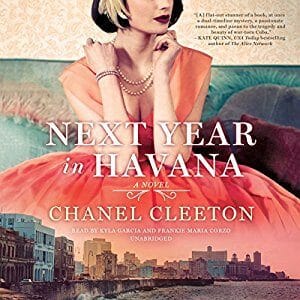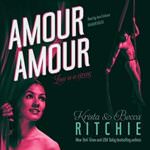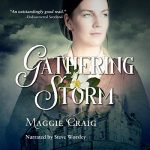 Narrated by Kyla Garcia and Frankie Maria Corzo
Narrated by Kyla Garcia and Frankie Maria Corzo
If you love historical fiction with romance elements, particularly if you are looking for something different, you will not want to miss Next Year in Havana. First off, for fans of Ms. Cleeton’s, I have to first caution you that this book is nothing like her prior romances. Instead, this book is steeped with accounts of what it was like to have lived in Cuba at around the time of Fidel Castro’s revolution (half of the book takes place in Cuba in 1958 and 1959) and what it is like today for Cubans as well as the Cuban American exiles–and their family members–who fled Cuba for United States and are brave enough to go back to visit Cuba today. For the daughter of Cuban American parents, this story was like a portal to the past while at the same time ringing true with stories that have been passed down from prior generations. Additionally, as a romance lover, I will tell you that there are also romance elements of two love stories (one that takes place in the past and one that occurs in today’s time), though this is not a traditional romance.
The book is told in alternating chapters from the point of view of: Elisa Perez, the daughter of a sugar baron, and a debutante in Cuba’s high society during the years that the dictator, Fulgencio Bautista, ran Cuba; and Marisol Ferrera, her granddaughter, and a journalist who resides in Miami today.
Most of the story told from Elisa’s perspective sheds light on how the higher classes in Cuba slowly came to realize that their power and wealth (and in many cases, even their lives) were in jeopardy, as well as on the dangerous conditions revolutionaries endured to realize what they believed was a better change for Cuba. It was a turbulent, dangerous time for both sides. In many cases, politics divided even members of the same family and in the end, no one was safe. It is amidst this backdrop that Elisa meets a revolutionary, Pablo, and falls in love. But can a love between such divided political lines ever lead to a HEA?
The parts of the story from Marisol’s perspective take place in today’s time. Marisol’s grandmother, Elisa, has just passed away and Marisol has been left with the task of deciding where to spread Elisa’s ashes. Knowing how much Elisa longed to one day return to her home–a desire so desperate that exiles often toast to “Next Year in Havana”–Marisol knows without a doubt what she must do: return to Cuba. So Marisol books a passage under a journalist visa and embarks on a journey that leads her to discover not only her grandmother’s secrets, but also how tumultuous and dangerous Cuba can still be for those that don’t fall in line with the Communist regime (a fact that lives on even after Castro’s 60 year rule has finally come to an end). It is amidst this backdrop that Marisol meets and falls in love with Luis, the grandson of her grandmother’s best friend, whose lives have taken a very different path as they decided to stay in Cuba. Luis is a history professor at the University of Havana, and though he has chosen to stay in Cuba, his political ideologies are far more aligned with that of Cuban exiles–a factor that has flagged him as a threat amongst the Communist leadership in Cuba. Can there possibly be a HEA for Marisol and Luis under the circumstances?
While the story was undoubtedly a hit for me, unfortunately the narration did not meet the same expectations. To clarify, it wasn’t bad, it just was devoid of much differentiation between characters voices–a trait that I have come to expect from romance novels. In that regard, not only did the characters of the same gender generally all sound the same, but even those of the opposite sex only had minor intonation variations making it sound more like someone was reading a story rather than narrating a romance title.
I’m also used to the narrator communicating the emotion of the scene. In this case, it wasn’t that there wasn’t any emotion–in fact there was a sort of nostalgic ring to the narrators’ retelling of the story (almost as if they were reading a diary); but there wasn’t any change from scene to scene or within one. In other words, I’m used to a narrator communicating the mood of the scene (whether it be suspense, desire, tension), but in this case, the entire book was masked in one singular emotion, forcing the listener to rely on the words rather than just being able to sit back and experience the story.
Another issue that I found with the narration relates to the fact that there are two narrators, though I couldn’t tell you which is which, as they both sound very similar (leading me to question why two narrators had been chosen). In fact, it was only after I had finished the entire book that I realized this was the case. As is typical when I’m writing reviews, I go back to check for the narrator name/bio of a narrator that I’m not familiar with, and in this case when I went to get the name of the narrator, I was stunned to find that there were two. This made me go back to listen again to try to spot check to see if I could differentiate the narrators; but sadly, even with a more focused mission, I still couldn’t definitively do so. My best guess is that one narrator tells the story from Elisa’s perspective and the other from Marisol’s. This, in and of itself, wouldn’t be a bad thing, though perhaps unnecessary. But to the extent that this was the plan, I would have cast two different sounding narrators. In this story I believe that could have been more effectively accomplished by a narrator using a heavier accent for Elisa rather than casting two different narrators.
All in all, Next Year in Havana was an amazing journey. I thoroughly enjoyed the history as well as the glimpse into what Cuba is like today. Additionally, the romance aspects of this novel, while not the primary focus, nonetheless tugged at my heart strings.
Buy Next Year in Havana by Chanel Cleeton on Amazon



